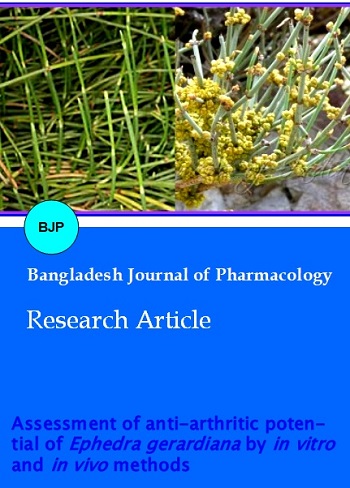Assessment of anti-arthritic potential of Ephedra gerardiana by in vitro and in vivo methods
DOI:
https://doi.org/10.3329/bjp.v12i4.32798Keywords:
Anti-arthritic, Ephedra gerardianaAbstract
The present study determines the anti-arthritic potential of Ephedra gerardiana ethanolic extract and its ethyl acetate, n-butanol and aqueous fractions adopting in vitro and in vivo tests. In vitro tests included thermally induced bovine serum albumin denaturation and egg albumin denaturation, also membrane stabilizing assay at concentration of 50-6400 µg/mL, whereas in vivo study comprised formaldehyde-induced arthritis at 50, 100 and 200 mg/kg doses. The crude extract and fractions inhibited protein denaturation and stabilized red blood cells membrane in concentration-dependent fashion, with maximal effect achieved at 6,400 µg/mL (p<0.001). Similarly, in formaldehyde model, the extract and fractions dose-dependently reduced injected paw volume and diameter, with maximum reduction at 200 mg/kg (p<0.001). However, results of aqueous fraction were on a par with hydroalcoholic extract in each test. These results suggest that E. gerardiana provides protection against arthritis that might be owing to the existence of phytoconstituents thus, supporting folkloric claim.
Video Clip of Methodology:
23 min 48 sec: Click to watch
Downloads
271
192 Read
75

Published
How to Cite
Issue
Section
License
Authors who publish with this journal agree to the following terms:
- Authors retain copyright and grant the journal right of first publication with the work simultaneously licensed under a Creative Commons Attribution License that allows others to share the work with an acknowledgement of the work's authorship and initial publication in this journal.
- Authors are able to enter into separate, additional contractual arrangements for the non-exclusive distribution of the journal's published version of the work (e.g., post it to an institutional repository or publish it in a book), with an acknowledgement of its initial publication in this journal.
- Authors are permitted and encouraged to post their work online (e.g., in institutional repositories or on their website) prior to and during the submission process, as it can lead to productive exchanges, as well as earlier and greater citation of published work (See The Effect of Open Access).
